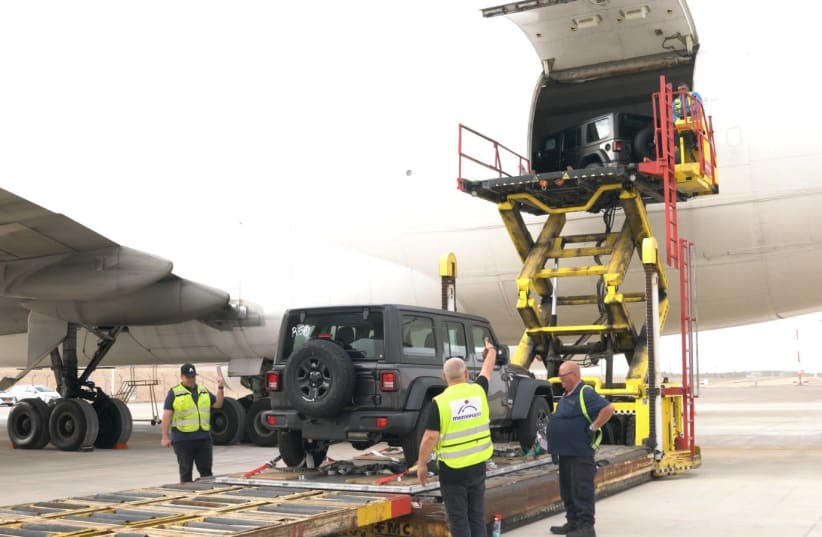Despite a challenging year marked by the global coronavirus pandemic, Israeli military exports were worth $8.3 billion last year, the Defense Ministry’s International Defense Cooperation Directorate (SIBAT) reported Monday.
They were 15% higher than 2019, when defense exports totaled $7.2b., and their value was second only to the $9.3b. in 2017.
“An increase in defense exports at the height of the global pandemic is a significant achievement,” SIBAT head Brig.-Gen. (res.) Yair Kulas said, adding that Israel has remained in the top 10 of global defense exporters.
Defense Minister Benny Gantz said Israeli industries have proven that “they are among the world’s leading companies, both in quality and in technological advance, even during a year of global crisis.”
The Defense Ministry has worked intensively to deepen government agreements, and “we will continue to do so,” he said.
Despite the challenging year, there was a significant increase in the number of transactions signed in 2020, especially government-to-government contracts, Kulas said.
He attributed the rise to the “intimate understanding of military needs” by Israel’s defense industries.
“SIBAT will continue to do what is necessary to support Israeli industries, as well as to deepen and expand Israel’s cooperation with our partners around the world,” Kulas said.
The world has for many years looked to Israel for security and intelligence, and the local defense industry has leading international companies that export to countries across the globe.
Last year, Israeli companies exported radar and electronic-warfare systems (16%), ammunition and armaments (16%), manned aircraft and avionics (13%), observation and optronics (13%), missiles, rockets and air-defense systems (10%), weapon stations and launchers (8%), C4I and communication systems (8%), drone systems and UAVs (6%), intelligence, information and cyber systems (5%), vehicles and APCs (3%), services and other (2%).
Israeli defense products were exported to the Asia Pacific region, 44% (up 41% from 2019); Europe, 30% (up 26%); North America, 20% (down 26%), Africa, 4%; and Latin America, 2% (down 4%).
With the signing of the Abraham Accords, there is “huge potential” for deals with Gulf countries, Kulas said.
According to Gantz, “Israel has new markets and significant opportunities for development that will contribute and inject billions into the local economy, bring new jobs and contribute to Israel’s security.”
“The entire defense establishment and SIBAT will continue to take all the necessary measures to support local industries, while investing in Israel’s periphery and contributing to the resilience of the State of Israel,” he said.
It is important that Israel does not sell weapons that could be resold and used to commit genocide or other human-rights violations, Gantz said.
“Our policy is to make sure that what we sell never harms our security and that we do not sell to those who do not meet the moral standards of the State of Israel,” he said.
Nevertheless, Israel has provided weapons to several countries accused of human-rights violations.
Azerbaijan, which has been accused of human-rights violations, is a major customer for Israel. Israel was a major arms supplier to Azerbaijan over the past five years, with more than $740 million in sales, according to data compiled by the Stockholm International Peace Research Institute (SIPRI). The purchases from Israel made up 60% of Azeri arms imports from 2016-2020, it said.
Earlier this year, during fighting between Azerbaijan and Armenia in the contested Nagorno-Karabakh region, Azeri forces used cluster munitions and kamikaze drones, including the Israeli-made Harop, against Armenian forces.
No Israeli weapons were sold to other countries accused of human-rights violations, such as Myanmar and Belarus, in the past year, the report said.
The Defense Ministry was concerned that no contracts would be signed due to the pandemic, but defense deals had been signed prior to the coronavirus outbreak, and many countries had an incentive to sign agreements, Kulas said. Several European countries had approached SIBAT to help them defend their borders during the pandemic.
Kulas said he was concerned about the coming three years due to an expected decrease in defense budgets and agreements because of the pandemic.
Israeli arms exports in 2015-2019 were the highest ever and accounted for 3% of the global total, SIPRI reported in 2019. Israel was the world’s eighth-largest arms supplier, and its arms exports were 77% higher than in 2010-2014, the report said.
